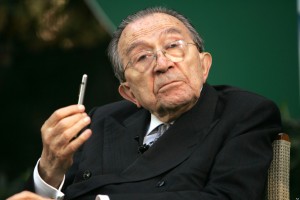Strangely, amid the spike in racial tensions after the killing of two black men by police in Louisiana and Minnesota, and of five white police officers by a black sharpshooter in Dallas, one American reality has gone unmentioned. The U.S. has been fighting wars — declared, half-declared, and undeclared — for almost 15 years and, distant as they are, they’ve been coming home in all sorts of barely noted ways. In the years in which the U.S. has up-armored globally, the country has also seen an arms race developing on the domestic front. As vets have returned from their Iraq and Afghan tours of duty, striking numbers of them have gone into police work at a time when American weaponry, vehicles, and military equipment — including, for instance, MRAPs (mine-resistant ambush protected vehicles) — have poured off America’s distant battlefields and, via the Pentagon, into police departments nationwide. And while the police were militarizing, gun companies have been marketingbattlefield-style assault rifles to Americans by the millions, at the very moment when it has become ever more possible for citizens to carry weapons of every sort in a concealed or open fashion in public.
The result in Dallas: Micah Johnson, a disturbed Army Reserves veteran, who spent a tour of duty in Afghanistan and practiced military tactics in his backyard, armed with an SKS semi-automatic assault rifle, wearing full body armor, and angry over police killings of black civilians, took out those five white officers. One of them was a Navy vet who had servedthree tours of duty in Iraq and another a former Marine who had trained local police for DynCorp, a private contractor, in Iraq and Afghanistan. Meanwhile, civilian protesters, also armed with assault rifles (quite legal in the streets of Dallas), scattered as the first shots rang out and were, in some cases, taken in by the police as suspects. And at least two unarmed protesters were wounded by Johnson. (Think of that, in his terms, as “collateral damage.”) In the end, he would be killed by a Remotec Andros F5 robot, built by weapons-maker Northrop Grumman, carrying a pound of C4 plastic explosive, and typical of robots that police departments now possess.
In other words, this incident was capped by the first use of deadly force by a drone in the United States. Consider that a war-comes-home upping of the ante. Already, reports the Defense One website, makers of military-grade robots — a burgeoning field for the Pentagon — are imagining other ways to employ such armed bots not only on our distant battlefields but at home in a future in which they will be “useful, cheap, and ubiquitous,” and capable ofTasing as well as killing.
Of course, among the many things that have also come home from the country’s wars, Predator and Reaper drones are now flying over “the homeland” on missions for the Pentagon, not to mention the FBI, the Border Patrol, and other domestic agencies. So the future stage is set. Once you’ve used any kind of drone in the U.S. to kill by remote control, it’s only logical — given some future extreme situation — to extend that use to the skies and so consider firing a missile at some U.S. target, as the CIA and the Air Force have been doing regularly for years in places like Afghanistan, Pakistan, Yemen, and Somalia. And of course, in our domestic arms race, with small drones commercially available to anyone and the first of them armed (no matter the rudimentary nature of that armament), it’s not hard to imagine a future Micah Johnson, white or black, using one of them sooner or later. After all, Johnson was already talking about planting “IEDs” (the term for insurgent roadside bombs in our war zones) and a flying IED is a relatively modest step from there.
So, welcome to the “home front,” folks. And speaking of drones, it’s worth giving a little thought to what might, in fact, still come home, to the sort of example that two administrations have set by turning the president into an assassin-in-chief and regularly creating law for themselves when it comes to the targeting of distant peoples. In that light,TomDispatch regular Rebecca Gordon considers America’s Trojan Horse technology of death and just what it may someday smuggle into “the homeland.”
Tom Dispatch
The Trojan Drone: An Illegal Military Strategy Disguised as Technological Advance
Think of it as the Trojan Drone, the ultimate techno-weapon of American warfare in these years, a single remotely operated plane sent to take out a single key figure. It’s a shiny video game for grown ups — a Mortal Kombator Call of Duty where the animated enemies bleed real blood. Just like the giant wooden horse the Greeks convinced the Trojans to bring inside their gates, however, the drone carries something deadly in its belly: a new and illegal military strategy disguised as an impressive piece of technology.
The technical advances embodied in drone technology distract us from a more fundamental change in military strategy. However it is achieved — whether through conventional air strikes, cruise missiles fired from ships, or by drone — the United States has now embraced extrajudicial executions on foreign soil. Successive administrations have implemented this momentous change with little public discussion. And most of the discussion we’ve had has focused more on the new instrument (drone technology) than on its purpose (assassination). It’s a case of the means justifying the end. The drones work so well that it must be all right to kill people with them.
The Rise of the Drones
The Bush administration launched the assassination program in October 2001 in Afghanistan, expanded it in 2002 to Yemen, and went from there. Under Obama, with an actual White House “kill list,” the use of drones has again expanded, this time nine-fold, with growing numbers of attacks in Pakistan, Yemen, Libya, and Somalia, as well as in the Afghan, Iraqi, and Syrian war zones.
There’s an obvious appeal to a technology that allows pilots for the CIA, Joint Special Operations Command, or the Air Force to sit safely in front of video screens in Nevada or elsewhere in the U.S., while killing people half a world away. This is especially true for a president running a global war with a public that does not easily accept American casualties and a Congress that prefers not to be responsible for war and peace decision-making. Drone assassinations have allowed President Obama to spread the “war on terror” to ever more places (even as he quietly retired that phrase), without U.S. casualties or congressional oversight and approval.
One problem has, however, dogged the drone program from the beginning: just like conventional air strikes, remotely targeted missiles and bombs tend to kill the wrong people. Over the last seven years, the count of civilians killed by drones has been mounting. Actual figures are hard to come by, although a number of nongovernmental organizations and journalists have done a good job of collating information from a variety of sources and offering reasonable estimates.
Analysis from all these sources suggests that there are at least three reasons why civilians die in such attacks.
1. The intelligence information on the individual targeted is often wrong. He isn’t where they think he is, or he isn’t even who they think he is. For example, in 2014 a British human rights organization, Reprieve, compiled data on drone strikes that targeted specific individuals in Yemen and Pakistan.According to the Guardian, Reprieve’s work
indicates that even when operators target specific individuals — the most focused effort of what Barack Obama calls ‘targeted killing’ — they kill vastly more people than their targets, often needing to strike multiple times. Attempts to kill 41 men resulted in the deaths of an estimated 1,147 people, as of 24 November [2014].
Some of these men were reported in the media as killed multiple times. Even if they didn’t die in the first, second, and in some cases third attempts, other people certainly did. Reprieve also reports one particularly egregious case of mistaken identity:
Someone with the same name as a terror suspect on the Obama administration’s ‘kill list’ was killed on the third attempt by U.S. drones. His brother was captured, interrogated, and encouraged to ‘tell the Americans what they want to hear’: that they had in fact killed the right person.
2. There isn’t even a named target. The CIA has long based drone assassination targeting for many missions not on direct intelligence about a particular individual, but on what it calls the “signature” of possible terrorist activity (that is, the behavior or look of people below). Such “signature strikes” target unidentified individuals based on some suspicious activity, usually picked up through drone surveillance. Such a “signature” can be as ill defined as “a gathering of men, teenaged to middle-aged, traveling in convoys or carrying weapons” in countries where many men may be armed. Unfortunately, while such a gathering may indeed indicate some kind of military activity, it may also describe a rural wedding in, say, Yemen, involving driving in convoy from the groom’s town to the bride’s, accompanied sometimes by celebratory gunfire.
Not everyone in the government is convinced that signature strikes are a good idea. In 2012, the New York Timesreported this joke at the State Department: “When the C.I.A. sees ‘three guys doing jumping jacks,’ the agency thinks it is a terrorist training camp.”
 The fact that signature strikes continue to this day suggests that Secretary of State John Kerry was not entirely truthful when, in 2013, he saidat a BBC forum: “The only people that we fire a drone at are confirmed terrorist targets at the highest level after a great deal of vetting that takes a long period of time. We don’t just fire a drone at somebody and think they’re a terrorist.”
The fact that signature strikes continue to this day suggests that Secretary of State John Kerry was not entirely truthful when, in 2013, he saidat a BBC forum: “The only people that we fire a drone at are confirmed terrorist targets at the highest level after a great deal of vetting that takes a long period of time. We don’t just fire a drone at somebody and think they’re a terrorist.”
3. They were in the way, and so became “collateral damage.” This is the term military theorists regularly use to describe human beings or civilian infrastructure unavoidably destroyed in an attack on a legitimate military target. Of course, a drone operator’s understanding of the term “unavoidable” may be different from that of a woman who has just lost three of her four sons as they were returning home from shopping for supplies to celebrate Eid-al-Fitr, the end of the holy month of Ramadan.
In addition, drone strikes don’t just kill people, including women and children; they also destroy buildings and other property. For example, the Bureau of Investigative Journalism says that, in Pakistan, more than 60% of all strikes target domestic buildings — people’s houses. In other words, “collateral damage” often refers to the destruction of the homes of any survivors of a drone attack.
Not surprisingly, people don’t like living in terror of deadly missiles screaming out of a clear blue sky. Many observers have argued that terrorist organizations have used widespread fear and anger over drone attacks as a recruiting tool. Al-Qaeda and ISIS appear to offer Pakistanis, Yemenis, and others an alternative to simply waiting for an attack they can’t prevent. The CIA itself recognized the counterproductive potential of drone killings, which they call “HVT [High Value Target] operations.” A leaked July 2009 CIA report on “Best Practices in Counter-Insurgency” outlines the issues:
Potential negative effects of HVT operations include increasing the level of insurgent support, causing a government to neglect other aspects of its counterinsurgency strategy, altering insurgent strategy or organization in ways that favor the insurgents, strengthening an armed group’s bond with the population, radicalizing an insurgent group’s remaining leaders, creating a vacuum into which more radical groups can enter, and escalating or deescalating a conflict in ways that favor the insurgents.
So there are long-term strategic problems with targeted killings by drone. In addition, drones may help spread and intensify terror movements and insurgencies, rather than destroying them or their leaderships. Often, as Andrew Cockburn has made clear in his book Kill Chain, the successors to leaders assassinated by drone turn out to be younger, more effective, and more brutal.
There is, however, another problem with this sort of warfare. Such killings — at least when they take place outside a declared war zone — are almost certainly illegal; that is, they are murders, plain and simple.
Targeted Killing Is Murder
In my household we have a rule: we’re not allowed to kill something just because we’re afraid of it. This has saved the lives of countless spiders and other creatures sporting (in my view at least) too many legs.
Whatever your view on arachnids, should it really be permissible to killpeople simply because we are afraid of them? After all, that’s what these drone assassinations are — extrajudicial executions of people someone believes we should be afraid of. It is easier to see an illegal execution for what it is when the killer is not separated from the target by thousands of miles and a video screen. Drone technology is really a Trojan Horse, a distracting, glitzy means of smuggling an illegal and immoral tactic into the heart of U.S. foreign relations.
Not all killing is illegal, of course. There are situations in which both international and U.S. laws permit killing. One of these is self-defense; another is war. However, a “war” waged against a tactic (terrorism), or even more vaguely, against an emotion (terror) is only metaphorically a war. Under international law, real wars, in which it is legal to kill the enemy, involve sustained combat between organized military forces.
Outside of the fighting in Iraq, Afghanistan, and now possibly Syria (where Congress has arguably never even declared war), the “war on terror” is not a war at all. It is instead a conflict with an ever-expanding list of targets, no defined geographical boundaries, and no foreseeable endpoint. It is a campaign against any conceivable potential U.S. enemy, fought in fits and starts in many countries on several continents. It involves ongoing covert operations largely hidden from everyone except its targets. As an undertaking, it lacks the regular, sustained conflict between armies that characterizes war in the legal sense. Such operations fit another category far better: assassination, illegal at least since President Jimmy Carter’s Executive Order 12036, which stated, “No person employed by or acting on behalf of the United States Government shall engage in, or conspire to engage in, assassination.”
Nor is the Middle East the only region where the United States is using targeted killing outside a shooting war. The U.S. military also deploys dronesin parts of Africa. In fact, President Obama’s nominee to head U.S. Africa Command, Marine Lieutenant General Thomas Waldhauser, recently toldSenator Lindsay Graham that he thinks he should be free to order drone killings on his own authority.
So much for war and “war.” What about self-defense? At every stage of the “war on terror,” Washington has claimed self-defense. That was the explanation for rounding up hundreds of Muslims living in the U.S. immediately after the attacks of 9/11, torturing some of them, and holding them incommunicado for months in a Brooklyn, New York, jail. It was the excuse offered for beginning torture programs in CIA “black sites” and at Guantánamo. It was the reason the U.S. gave for invading Afghanistan, and later for invading Iraq — before, as Bush administration representatives andthe president himself kept saying, “the smoking gun” of Saddam Hussein’s supposed weapons of mass destruction turned into “a mushroom cloud” over, presumably, some American city.
And self-defense has been the Justice Department’s rationale for targeted killing as well. In a November 2011 paper prepared by that department for the White House, its author (identity unknown) outlined the necessary conditions to make a targeted killing legal:
(1) an informed, high-level official of the U.S. government has determined that the targeted individual poses an imminent threat of violent attack against the United States;
(2) capture is infeasible, and the United States continues to monitor whether capture becomes feasible; and
(3) the operation would be conducted in a manner consistent with applicable law of war principles.”
That would seem to rule out most U.S. targeted killings. Few of their targets were people on the verge of a violent attack on the United States or U.S. soldiers in the field. Ah, but in the through-the-looking-glass logic of the Obama Justice Department, “imminent” turns out not to mean “imminent” in the sense that something is about to happen. As that document explains: “The condition that an operational leader present an ‘imminent’ threat of violent attack against the United States does not require the United States to have clear evidence that a specific attack on U.S. persons and interests will take place in the immediate future.
It turns out that the threat from any “operational leader” is always imminent, because “with respect to al-Qaeda leaders who are continually planning attacks, the United States is likely to have only a limited window of opportunity within which to defend Americans.” In other words, once a person has been identified as an al-Qaeda or allied group “leader,” he is by definition “continually planning attacks,” always represents an imminent danger, and so is a legitimate target. Q.E.D.
In fact, few enough of these targeted killings, including the signature ones can be defended as instances of self-defense. We should call them what they really are: extrajudicial executions.
The U.N. Special Rapporteur on Extrajudicial, Summary, or Arbitrary Executions has agreed with this view. In his 2013 report to the General Assembly, Christof Heyns noted that international human rights law guarantees a right to life. This right is enshrined in the 1948 Universal Declaration of Human Rights and given legal force in, among other treaties, the International Covenant on Civil and Political Rights, to which the United States is a party. There certainly are legal limits to the right to life, including — in countries that have the death penalty — the state’s right to execute a person after a legitimate trial. To execute someone without a trial, however, is an “extrajudicial killing” and a human rights crime.
Obama “Comes Clean”
By the middle of President Obama’s second term in office, criticism of this extrajudicial killing program, and especially of the civilian deaths involved, had mushroomed. So, in May 2013, at least 11 years after the program was launched, the president announced a shift in drone strategy, telling an audience at the National Defense University that the U.S. would engage in “targeted killings” of al-Qaeda militants only when there was a “near-certainty” that no civilians would be injured. He added that he was planning to make the drone program more transparent than it had been and to transfer most of its operations from the CIA to the Pentagon.
In the two years since, little of this has happened. Although Obama has continued the job of personally approving drone targets, the CIA still runsmuch of the program.
On July 1st, he did finally take a step towards providing greater transparency. The Office of the Director of National Intelligence issued a report stating that, outside of more conventional war zones like those in Syria, Afghanistan, and Iraq, U.S. airstrikes have killed “64 to 116 civilian bystanders and about 2,500 members of terrorist groups.” These estimates are, in fact, quite a bit lower than those supplied by the various groups that track such killings. Note as well that, legally speaking, not only the “collateral damage” victims, but all those that Americans identified as “members of terrorist groups” died via illegal, extrajudicial executions.
The document fulfills one of the requirements of a newly issued executive order, which, among other things, requires the government to release a report by May 1st of each year containing “information about the number of strikes undertaken by the U.S. Government against terrorist targets outside areas of active hostilities [i.e., outside genuine war zones]” for the previous calendar year.
Attached to the executive order was a “fact sheet,” which noted that one goal of the new executive order is to “set standards for other nations to follow.” How happy would the United States really be if other nations decided that they had the right to kill anyone who scares them? How would the United States react if Syrian President Bashar al-Assad decided to take out a U.S. general or two, on the grounds that, since the U.S. is supporting forces that seek to depose him, those generals are (as the Fact Sheet puts it) “targetable in the exercise of national self-defense”?
Some critics of the Obama drone program have welcomed the executive order, which does include a new emphasis on protecting civilians. But the larger effect of the order is to make the practice of illegal assassination a permanent feature of U.S. policy. It assumes that we can expect an annual murder toll announcement for years to come. No future is contemplated in which the United States will not be raining death from the sky on people who cannot defend themselves. The drones will continue to fly, but the Trojan Drone’s work is complete.
Rebecca Gordon, a TomDispatch regular, teaches philosophy at the University of San Francisco. She is the author of Mainstreaming Torture and most recently of American Nuremberg: The U.S. Officials Who Should Stand Trial for Post-9/11 War Crimes. She can be contacted at www.mainstreamingtorture.org.
 Over 100 firemen, policemen, and building maintenance personnel who were inside the two towers prior to their collapse report hearing and experiencing multiple explosions. According to William Rodriguez, a maintenance employee in the north tower, there were explosions in the sub-basements of the tower prior to the time airplanes are said to have hit the towers.
Over 100 firemen, policemen, and building maintenance personnel who were inside the two towers prior to their collapse report hearing and experiencing multiple explosions. According to William Rodriguez, a maintenance employee in the north tower, there were explosions in the sub-basements of the tower prior to the time airplanes are said to have hit the towers.
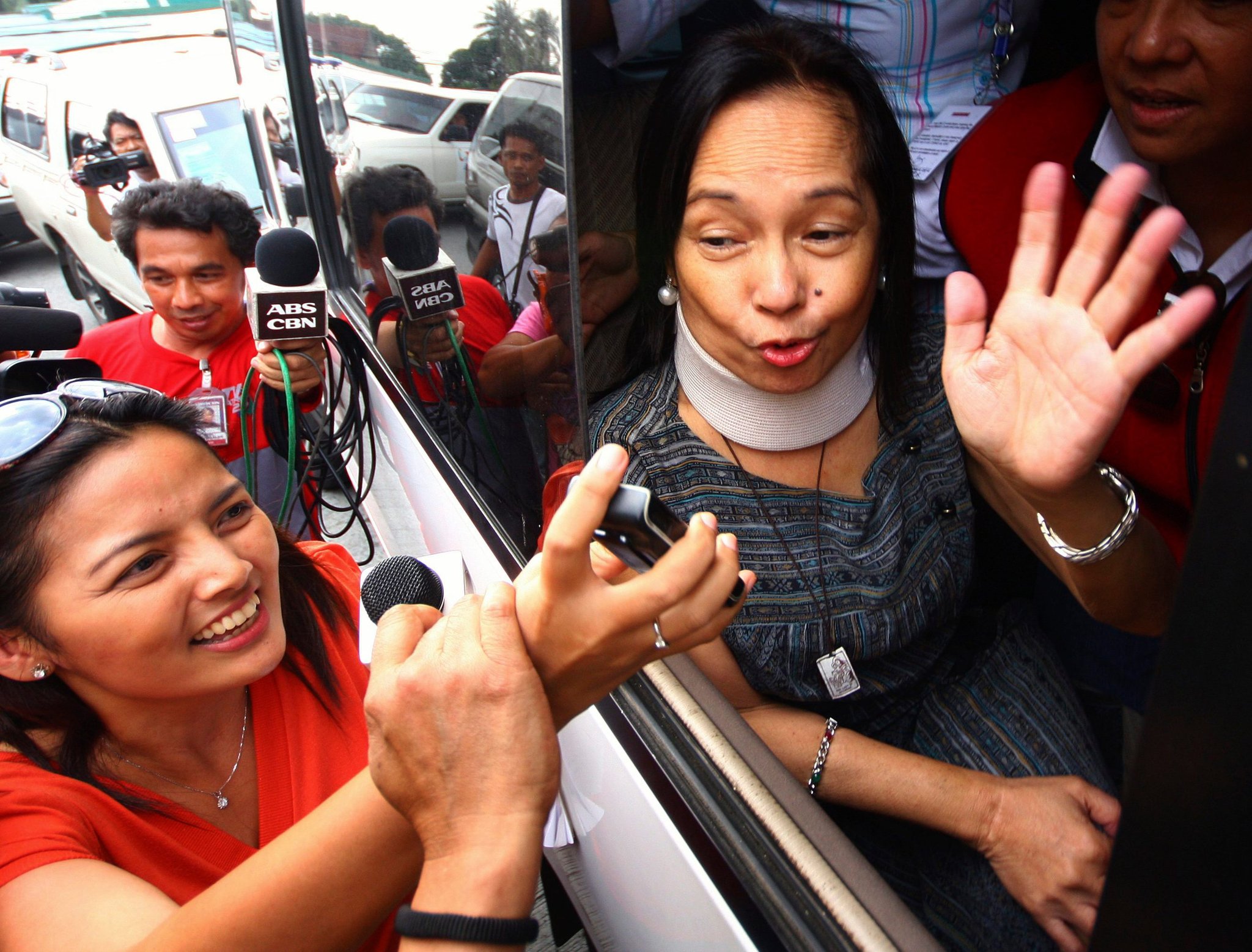





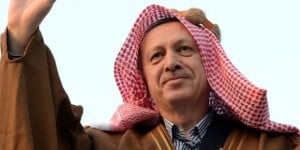


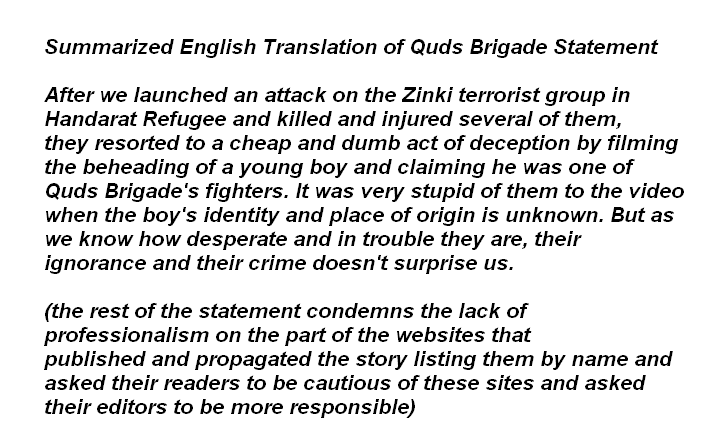
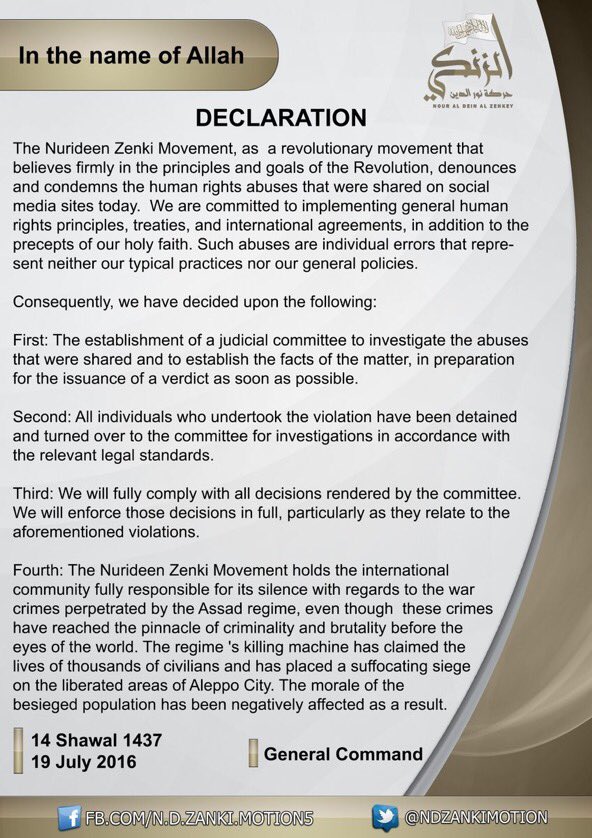



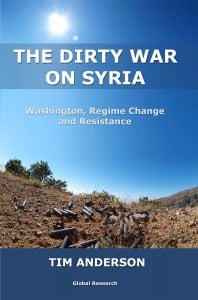
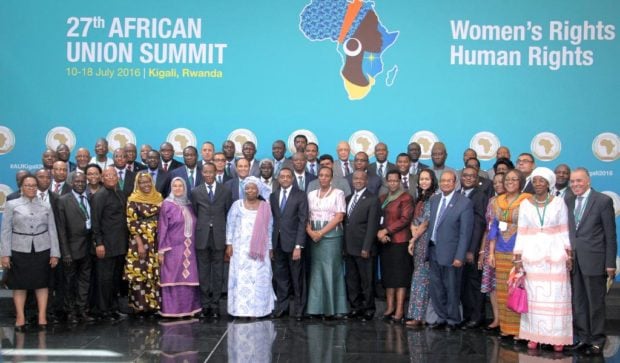


 The incident highlights several inconvenient facts. First, it exposes the fact that Jaish al-Islam through its own admission maintains a “joint command center” with Jubhat al Nusra – a US State Department designated foreign terrorist organization – meaning that Jaish al-Islam itself is coordinating with and fighting alongside listed terrorists.
The incident highlights several inconvenient facts. First, it exposes the fact that Jaish al-Islam through its own admission maintains a “joint command center” with Jubhat al Nusra – a US State Department designated foreign terrorist organization – meaning that Jaish al-Islam itself is coordinating with and fighting alongside listed terrorists.